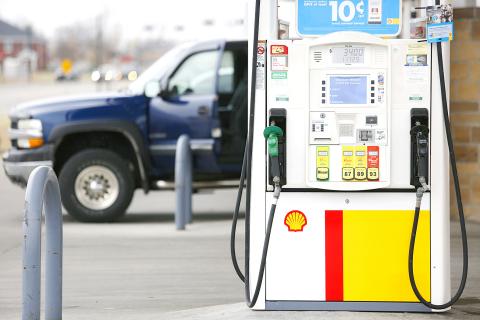Royal Dutch Shell PLC came through a quarter of volatile oil prices to beat earnings estimates, delivering a surge in cash flow the company said would underpin “world-class” returns to investors.
The better-than-expected performance should help to ease questions about whether Shell can simultaneously afford to reduce debt and complete a US$25 billion share-buyback program, while also paying one of the world’s largest cash dividends.
Yet it also underlines some analysts’ concerns about the level of investment, as replacement of reserves fell well below average.

Photo: Bloomberg
Shell urged investors to focus on returns, as the company paid its entire dividend in cash, curbed debt and started the next tranche of its US$25 billion buyback program.
“We’re going to do it all, we need to do it all,” chief financial officer Jessica Uhl said in a Bloomberg television interview. “It’s important for you to understand the nature of Shell, the nature of our cash flows, which aren’t necessarily dependent on excessive levels of capital investment.”
The Anglo-Dutch oil major earned US$5.69 billion in the final quarter of last year, adjusted for one-time items. That is up from US$4.3 billion a year earlier, beating the average estimate of US$5.39 billion.
Investors reacted positively to the results, with Shell’s B shares rising 2.8 percent to £23.50 at 8:03am in London. In the past 12 months, the stock fell more than its European peers, declining about 6 percent compared with gains from BP PLC and Total SA.
Profit was the highest for that period in at least six years, matching an era when oil was trading at closer to US$100 a barrel. CEO Ben Van Beurden has made lowering costs a priority, first to survive a crude price collapse between 2014 and 2017, and then to keep the company competitive in case prices stay lower.
While that has helped boost profitability, some analysts have debated during the past month whether Shell is at risk of underinvesting.
Morgan Stanley analyst Martijn Rats said that US$65 oil, slightly above current prices, is probably too low for the company to continue its breakneck pace of shareholder distributions while maintaining a high enough capital expenditure to boost reserves.
Shell said it did not discover enough new oil and gas reserves to cover the hydrocarbons it pumped last year. It added 700 million barrels in new reserves, compared with production of about 1.4 billion barrels. As a result, its closely watched reserve-replacement ratio stood at 53 percent last year, well below the three-year average of 96 percent.
Rats said the ratio was affected by Shell having to de-book its giant Groningen natural gas field in the Netherlands, which the government has mandated to close because it is causing earthquakes.
Without that, the organic reserve replacement ratio would have been 98 percent, he said in a note.
Uhl argued that no one should be too fixated on reserves, because its exploration and production unit generates less than half of Shell’s cash flow.
The refining and marketing, and integrated gas businesses both did better than analysts expected, buoyed by trading and the start-up of the Geismar chemicals plant in the US.
Cash flow from operations, a crucial measure of the sustainability of spending on new projects and payouts to investors, was US$22 billion, three times the level a year earlier.

BYPASSING CHINA TARIFFS: In the first five months of this year, Foxconn sent US$4.4bn of iPhones to the US from India, compared with US$3.7bn in the whole of last year Nearly all the iPhones exported by Foxconn Technology Group (富士康科技集團) from India went to the US between March and last month, customs data showed, far above last year’s average of 50 percent and a clear sign of Apple Inc’s efforts to bypass high US tariffs imposed on China. The numbers, being reported by Reuters for the first time, show that Apple has realigned its India exports to almost exclusively serve the US market, when previously the devices were more widely distributed to nations including the Netherlands and the Czech Republic. During March to last month, Foxconn, known as Hon Hai Precision Industry

Taiwan Semiconductor Manufacturing Co (TSMC, 台積電) and the University of Tokyo (UTokyo) yesterday announced the launch of the TSMC-UTokyo Lab to promote advanced semiconductor research, education and talent development. The lab is TSMC’s first laboratory collaboration with a university outside Taiwan, the company said in a statement. The lab would leverage “the extensive knowledge, experience, and creativity” of both institutions, the company said. It is located in the Asano Section of UTokyo’s Hongo, Tokyo, campus and would be managed by UTokyo faculty, guided by directors from UTokyo and TSMC, the company said. TSMC began working with UTokyo in 2019, resulting in 21 research projects,

Ashton Hall’s morning routine involves dunking his head in iced Saratoga Spring Water. For the company that sells the bottled water — Hall’s brand of choice for drinking, brushing his teeth and submerging himself — that is fantastic news. “We’re so thankful to this incredible fitness influencer called Ashton Hall,” Saratoga owner Primo Brands Corp’s CEO Robbert Rietbroek said on an earnings call after Hall’s morning routine video went viral. “He really helped put our brand on the map.” Primo Brands, which was not affiliated with Hall when he made his video, is among the increasing number of companies benefiting from influencer

Quanta Computer Inc (廣達) chairman Barry Lam (林百里) yesterday expressed a downbeat view about the prospects of humanoid robots, given high manufacturing costs and a lack of target customers. Despite rising demand and high expectations for humanoid robots, high research-and-development costs and uncertain profitability remain major concerns, Lam told reporters following the company’s annual shareholders’ meeting in Taoyuan. “Since it seems a bit unworthy to use such high-cost robots to do household chores, I believe robots designed for specific purposes would be more valuable and present a better business opportunity,” Lam said Instead of investing in humanoid robots, Quanta has opted to invest